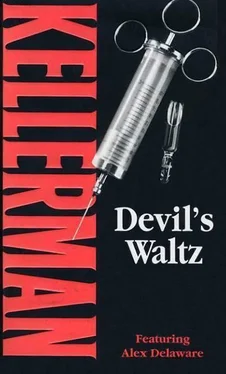“Sure.”
“Good.”
Something in her voice — a stridency I’d never heard before — made me stand there and wait.
But she just said “Good” again, and looked away, resigned. As if a critical moment had come and gone. When she started to play with her braid, I left.
No sign of Vicki Bottomley; the nurse on shift was a stranger. After completing my own notes, I reread Stephanie’s, the neurologist’s, and those of the consulting endocrinologist — someone named Alan Macauley, with strong, large handwriting.
The neurologist had found no abnormality on two successive EEGs and deferred to Macauley, who reported no evidence of any metabolic disorder, though his lab tests were still being analyzed. As far as medical science could tell, Cassie’s pancreas was structurally and biochemically normal. Macauley suggested further genetic tests and scans to rule out some sort of brain tumor, and recommended further “intensive psychological consultation per Dr. Delaware.”
I’d never met the man and was surprised to be referred to by name. Wanting to know what he meant by “intensive,” I looked up his number in a hospital directory and called it.
“Macauley.”
“Dr. Macauley, this is Alex Delaware — the psychologist who’s seeing Cassie Jones.”
“Lucky you. Been to see her recently?”
“About a minute ago.”
“How’s she doing?”
“Wiped out — post-seizural fatigue, I guess.”
“Probably.”
“Her mother said she didn’t hold her dinner down.”
“Her mother, huh?... So, what can I do for you?”
“I read your notes — about psychological support. Wondered if you had any suggestions.”
Long pause.
“Where are you now?” he said.
“Chappy Ward nursing station.”
“Okay, listen, I’ve got Diabetes Clinic in about twenty minutes. I can get there a little early — say in five. Why don’t you catch me? Three East.”
He waved when he saw me coming and I realized I’d seen him the day before at Ashmore’s memorial. The husky, dark, bald man who’d talked about Texas and guns, a Smith & Wesson in every black bag.
Standing, he looked even bigger, with thick sloping shoulders and stevedore arms. He had on a white polo shirt over pressed jeans and western ostrich boots. His badge was pinned just above the jockey-and-horse logo. His stethoscope was in one hand. The other hand made aeronautic movements — nosedives and fast climbs — as he talked to a gangly boy of around seventeen.
Fifteen minutes before clinic was scheduled to start and the Endocrinology waiting room was filling up. Nutritional posters hung on the walls. Children’s books and battered magazines were stacked on the table, along with brochures and packets of artificial sweetener.
Macauley slapped the boy’s back and I heard him say, “You’re doing great — keep it up. I know sticking yourself sucks the big hairy one, but depending on Mommy to stick you sucks even worse, doesn’t it? So keep her the heck out of your life and go have some fun.”
“Yeah, right,” said the boy. He had a big chin and big nose. Big jug ears, each pierced with three gold wire loops. Well over six feet, but Macauley made him look small. His skin was oily-looking and sallow, spotted with pimples on cheeks and brow. His hair had been mowed in a new-wave do with more levels and angles than an architect’s wet dream. “Party on,” he said glumly.
“Hey, party hearty , man,” said Macauley, “just as long as it’s sugar-free.”
“Fuck,” said the boy.
“Now, that’s okay, Kev. That you can do to your horny little heart’s content, long as you use a condom.”
The boy grinned despite himself.
Macauley slapped him again and said, “Okay, scram, get, vamoose, clear out of here. I’ve got sick people to deal with.”
“Yeah, right.” The boy pulled out a pack of cigarettes, stuck a smoke in his mouth, but didn’t light it.
Macauley said, “Hey, turkey, your lungs are someone else’s problem.”
The boy laughed and shambled off.
Macauley came over to me. “Noncompliant adolescents with brittle diabetes. When I die I know I’m going to heaven, ’cause I’ve already been to hell.”
He shot a thick arm forward. The hand at the end of it was big but his grip was restrained. His face was basset with a touch of bull terrier: thick nose, full lips, small, drooping dark eyes. The baldness and perpetual five o’clock shadow gave him a middle-aged look, but I guessed he was thirty-five or so.
“Al Macauley.”
“Alex Delaware.”
“Meeting of the Als,” he said. “C’mon out of here before the natives grow restless.”
He took me behind swinging doors just like those in Stephanie’s clinic, past a similar mix of clerks, nurses, residents, ringing phones, and scratching pens, to an examining room decorated with a sugar-content chart issued by one of the big fast-food chains. The five food groups with an emphasis on burgers and fries.
“What can I do for you?” he said, sitting on a stool and spinning back and forth in small semicircles.
“Any insights on Cassie?” I said.
“Insights? Isn’t that your department?”
“In a perfect world it would be, Al. Unfortunately, reality’s refusing to cooperate.”
He snorted and ran his hand over his head, smoothing nonexistent hair. Someone had left a rubber reflex hammer on the examining table. He picked it up and touched the tip to his knee.
“You recommended intensive psych support,” I said, “and I just wondered—”
“If I was being an especially sensitive guy or if I thought the case was suspicious, right? The answer is b. I read your notes in the chart, asked around about you, and found out you were good. So I figured I’d put in my two cents.”
“Suspicious,” I said. “As in Munchausen by proxy?”
“Call it what you want — I’m a gland-hand, not a shrink. But there’s nothing wrong with the kid’s metabolism, I can tell you that.”
“You’re sure of that?”
“Look, this isn’t the first time I’ve been involved in the case — I worked her up months ago, when she supposedly presented with bloody stools. No one ever actually saw the stools except the mom, and red spots on a diaper don’t make it in my book. We could be talking diaper rash. And my first go-round was rigorous . Every endocrine test in the book, some that weren’t.”
“Someone saw this latest seizure.”
“I know that,” he said impatiently. “The nurse and the U.C. And low sugar does explain it, physiologically. But what it doesn’t explain is why . She’s got no genetic or metabolic abnormality of any kind, no glycogen storage disorder, and her pancreas is functioning perfectly. At this point, all I’m doing is plowing old ground and throwing in some experimental assays I borrowed from the med school — basic science stuff they’re still getting baselines on. We might just have the most tested two-year-old kid in the Western Hemisphere. Wanna call Guinness?”
“What about something idiopathic — a rare variant of a known disease?”
He looked at me, passed the hammer from hand to hand. “Anything’s possible.”
“But you don’t think so.”
“What I don’t think is that there’s anything wrong with her glands. This is a healthy kid, presenting with hypoglycemia because of something else.”
“Something someone gave her?”
He tossed the hammer up in the air and snagged it with two fingers. Repeated the exercise a couple more times, then said, “What do you think?” He smiled. “Always wanted to do that with one of you guys. Seriously, though, yeah, that’s what I think. It’s logical, isn’t it, considering the history? And that sib who died.”
Читать дальше












